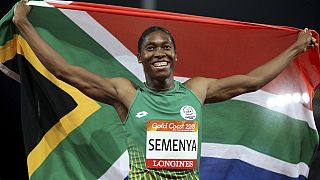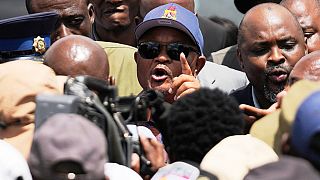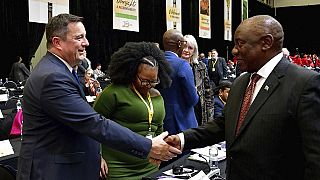South Africa
Embattled South African athlete Caster Semenya has told journalists that ‘she has no time for nonsense’, when asked about the impending IAAF regulations that could require her to take medication to reduce testosterone levels.
Asked by a journalist whether she would comply with the regulations set to be announced on Thursday, Semenya said she’s more concerned with keeping in shape in order to compete.
‘‘I have no time for nonsense. Medication or no medication, I am an athlete. My focus is more on getting healthy to compete,’‘ Semenya said.
Batshele bhuti ?”
— #SAXONWOLDSHEBEEN (dada_Mpisane) 25 avril 2018SAYoungLion: Our golden girl, Caster Semenya, doesn't have time for nonsense ???? pic.twitter.com/UWHZvyxUjA"
The International Association of Athletics Federations (IAAF) is set to publish new rules to prevent women with hyperandrogenism, which produces higher than normal levels of testosterone and is deemed by the governing body to give them an unfair advantage, from running distances from 400m to the mile.
IAAF would allow them to compete at international level only if they took medication to reduce naturally occurring levels of testosterone.
“All testosterone, either naturally occurring or artificially inserted into the body, provides significant performance enhancements,” IAAF head Seb Coe said.
Coe was speaking after the IAAF Council announced last month that following a review of available evidence it would revise its regulations, with the changes coming into force on Nov. 1.
Semenya, double Olympic and triple world champion over 800m and who completed the 800-1500 double at the Commonwealth Games this month, has always been a controversial figure in the sport as its authorities have sought a solution that respected her rights while also providing a “level playing field”.
The 27-year-old’s powerful physique and deep voice, followed by the revelations of her hyperandrogenism, left some rivals complaining that they faced an impossible and unfair challenge.
Reclassification
Media in the UK and South Africa on Wednesday published sections of the report ahead of its official release, revealing that the new hyperandrogenism regulations would include a separate female classification to be known as an Athlete with Differences of Sexual Development (DSD).
“Experts consulted by the IAAF have gathered and reviewed all of the published evidence and data, which indicates that increasing the level of circulating testosterone from the normal female range to the normal male range leads to increased muscle mass and strength and higher haemoglobin levels,” the report, which has not been seen by Reuters, is reported to have said.
The IAAF’s medical advisors have suggested the advantage held by DSD athletes is far less pronounced in short sprints or longer distance endurance races, leaving the door open for Semenya to move up to 5,000 or 10,000 metres if she desires.
The South African began raising eyebrows when she won the world junior championships in 2008 and the senior world title the following year, with dramatic improvement in her times.
The IAAF made Semenya take a sexual verification test, which was initially kept secret but revealed by the media in 2009.
Since then virtually all of Semenya’s performances have been followed by questions about her sexual and physical status, but she has long stopped answering them.













01:53
SMES under pressure as business confidence hits four-year low in South Africa
Go to video
Former South African deputy president David Mabuza dies at 64
00:56
South Africa: At least 101 dead in Eastern Cape floods as rescue efforts continue
Go to video
African gut study reveals urbanization threatens microbial diversity
01:50
Faith Kipyegon falls short of historic sub-four minute mile but vows to keep pushing